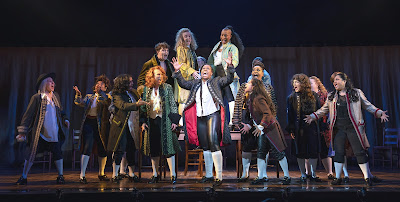Revivals used to be fairly simple. A producer would take a beloved title or maybe even an underappreciated one, cast it with a star or two and voilà, a show. But that’s not how it goes nowadays. Instead of theatergoers greeting revivals with “It’s so great to see you again,” they’re now asking, “Why are you here?” “What do you have to say about the way we live now?”
So that’s how we get a Company with a female Bobbie. Or A Death of a Salesman with a black Loman family. Or a 1776 with female, non-binary and trans actors portraying the Founding Fathers. Sometimes these new interpretations work. Sometimes they don’t. And I’m sorry to have to say that for me, the production of 1776 that opened this week at Roundabout Theatre Company’s American Airlines Theatre doesn’t.
The story of the contentious days leading up to the signing of the Declaration of Independence on July 4, 1776 and the shameful compromise that was made to get the job done was always a tough challenge for a musical. It’s basically just a bunch of white guys in breeches, waistcoats and perukes yelling at one another. The entire score consists of just 12 songs, with one reprise.
But somehow composer Sherman Edwards and book writer Peter Stone managed to turn all of that into an entertaining—and surprisingly suspenseful—musical that beat out Hair for the Tony in 1969 and ran for 1,217 performances.
The show has been one of my favorites since I saw the original production from a seat high in the balcony during a spring break from college. And every Fourth of July, I try to watch at least some of the 1972 movie version, which was filmed with almost the entire original Broadway cast, including the invaluable William Daniels balancing just the right mix of sweet and sour as the right-minded but irascible John Adams.
The new 1776 does start off promisingly. All the members of the ensemble—diverse in terms of age, color, ethnicity, gender identity and size—walk onstage wearing various forms of streetwear and then they put on frock coats, take off their footwear, pull up the kind of white knee-length stockings men wore in the 18th century and step into the buckled shoes that have been waiting along the rim of the stage: a clever and clear statement that they are now stepping into the roles of the men who founded this country.
Alas, the show goes down from there. And that’s mainly because it’s a concept without a cause, failing to make the argument for why those actors are stepping into those shoes. When Hamilton cast black and brown actors as the Founding Fathers, composer Lin-Manuel Miranda and director Thomas Kail made the case that this country also belongs to the people who had been previously disenfranchised by it.
But Jeffrey L. Page and Diane Paulus, who co-directed this revival of 1776, just have their actors go through the motions of the musical. Their revival was conceived before the coronavirus pandemic but they’ve recently said that they want it to reflect the racial reckoning set off by the murder of George Floyd in 2020 (click here to read one of those interviews).
That retrofitting has produced a few on-the-nose gestures: the new character of Jefferson’s body slave has been added but given no lines except for an ironic but-not-me head shake when Jefferson talks about all men being created equal; a dance mimics enslaved Africans in chains during “Molasses to Rum,” without bringing any new insights into that song about the slave trade that has always been part of the musical.
The sense of suspense about whether the quarreling delegates will ever reach an agreement that usually animates the play is also lost. Hell, even the calendar that has traditionally hung on the wall, counting down the days to July 4, is missing here. It’s been replaced by intermittent video projections of dates but they’re too easily forgotten.
More damaging is the fact that with a few exceptions (Shawna Hamic appropriately hamming it up as South Carolina’s vain delegate Richard Henry Lee, Patrena Murray’s droll take on Benjamin Franklin) the actors don’t do enough with the characters. Crystal Lucas-Perry, who will be leaving the production at the end of the month to join the upcoming Ain't No' Mo," gives too much honey and too little vinegar to her portrayal of John Adams.
When you add it all up, the enterprise carries the whiff of a middling community theater production. Even Scott Pask’s bare-bones set looks less like a concept than something that was done on a tight budget. And the video projections toward the end of the second act come off as a Hail Mary pass for relevancy.
So a production that should offer smart commentary instead just seems gimmicky. It’s great to see so many female-identifying actors on a stage but 1776 was composed primarily for men’s voices (there are only two female roles—Martha Jefferson and Abigail Adams—in the piece). And the revival stumbles here too.
There are few more rousing opening numbers than “Sit Down, John,” in which his fellow delegates to the Continental Congress admonish Adams, the pre-eminent but annoying advocate for separation from the British, to stop heckling them. I had hoped that this production would imbue that number with the passionate roar of the pussyhat-wearing participants in the 2017 Women's March. Instead, the song sounded like a track from the 1970s bubblegum band Josie and the Pussycats.
All of which left me wondering, Why is this show here?

2 comments:
Thanks for your insightful review.
MrDJR, thank you for taking the time to send such kind words.
Post a Comment